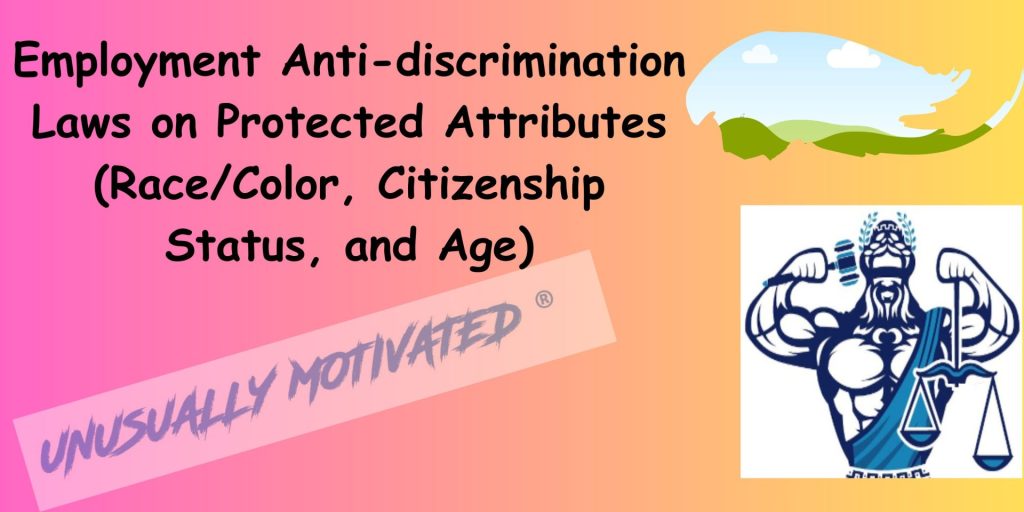Here at the Law Office of Vincent Miletti, Esq. and the home of the #UnusuallyMotivated movement, we take pride as a resilient and dependable legal services firm, providing such services in both a traditional and online, web-based environment. With mastered specialization in areas such as Employment and Labor Law, Intellectual Property (IP) (trademark, copyright, patent), Entertainment Law, and e-Commerce (Supply Chain, Distribution, Fulfillment, Standard Legal & Regulatory), we provide a range of legal services including, but not limited to traditional legal representation (litigation, mediation, arbitration, opinion letters and advisory), non-litigated business legal representation and legal counsel, and unique, online legal services such as smart forms, mobile training, legal marketing and development.
Still, here at Miletti Law®, we feel obligated to enlighten, educate, and create awareness about how these issues and many others affect our unusually motivated® readers and/or their businesses. Accordingly, to achieve this goal, we have committed ourselves to creating authoritative, trustworthy, & distinctive content, which looks to educate and deliver in a manner that only Miletti Law® can. Usually, this content is featured as videos posted on our YouTube Channel https://www.youtube.com/channel/UCtvUryqkkMAJLwrLu2BBt6w and blogs that are published on our website WWW.MILETTILAW.COM. With the ball in your court, yours is an effortless obligation to subscribe to the channel and sign up for the Newsletter on the website, which encompasses the best way to ensure that you stay in the loop and benefit from the knowledge bombs we drop here!
As the authoritative force in Employment Law, we are committed to providing you with authoritative, up-to-date, and trustworthy content through which you can draw enlightening information to stay ahead of the game in your business. In this regard, this blog is Part III of our new, multipart series on the “Enforcement of the Protection of Employers’ Confidential Information & Trade Secrets.” In Part I of this series, we took a deeper exploration of the available legal recourse and guidance and provided you with the definition of trade secrets as given under both the DTSA (Federal Defend Trade Secrets Act) and the Uniform Trade Secret Acts (Unif. Trade Secrets Act § 1(4), (UTSA)). We also provided you with an overview of the definition of the term “misappropriation,” as defined under both the DTSA and UTSA in Part II of the series. To move forward the discussion, we have provided you with a hands-on guide regarding “How to Draft a DTSA (Federal Defend Trade Secrets Act) Complaint” in this blog and Part III of the series.
How to Draft a DTSA (Federal Defend Trade Secrets Act) Complaint
For starters, a trade secret misappropriation complaint filed under the DTSA should precisely specify the reason why such information meets the qualification for trade secret protection. With regards to the definition provided in Part I of the series, referring to information as “trade secret” under the DTSA is not legally sufficient. This means that in line with the definition, a complainant is required to plausibly explain how such information is a trade secret. Otherwise, the complaint is susceptible to dismissal with prejudice where a complainant fails to do so.
Nonetheless, during court proceedings, the employer must take caution not to disclose too much information related to the allegedly misappropriated trade secret. In this regard, an employer should consider two critical issues. Firstly, the employer should ensure the complaint includes sufficient detail that would help to (1) survive a motion to dismiss, (2) demonstrate to the court that the allegedly misappropriated information meets the qualification of a trade secret, and (3) state a claim. Secondly, an employer should ensure that the complaint includes limited detail regarding the trade secret. This is because a trade secret may lose its protected status following public disclosure of such information, irrespective of whether the employer prevails or not. It should be recognized that employers should seek the guidance and services of qualified and competent attorneys who would help them to balance these two.
Nonetheless, during court proceedings, the DTSA permits employers to maintain the secrecy of the allegedly misappropriated trade secrets as a way of helping to strike this balance. Pursuant to 18 U.S.C. § 1835(b), the DTSA specifies that unless a court provides the owner of a trade secret with an opportunity to file a submission under seal describing their intention to keep the information in question confidential, such an owner may not be directed or authorized by a court to disclose any information warranting to remain a trade secret. Through this provision, any trade secret owner is provided with the opportunity to identify why a specific piece of information should not be exposed to public disclosure and what information should be considered a protected trade secret. This implies that if a trade secret owner makes a proper submission, such an owner may use the DTSA provision as a tool to shield their trade secret and other confidential information from being disclosed publicly during court proceedings. However, an employer must provide just sufficient detail to achieve the three goals mentioned above and, ultimately, prevail in a trade secret misappropriation lawsuit and have such information receive the trade secret protected status.
In Part IV of this series, we will provide you with a hands-on guide regarding “The Statute of Limitations under the DTSA” & “DTSA Civil Seizure.”
In the meantime, stay tuned for more education, training, and legal guidance. In the interim, reach out to us with questions and/or comments on our website at the Contact Us page!
Always rising above the bar,
Isaac T.,
Legal Writer & Author.
 Professional Legal & Business Services And Representation - English & Espanol!
Professional Legal & Business Services And Representation - English & Espanol!

 314-648-2586
314-648-2586 CALL US NOW
CALL US NOW







